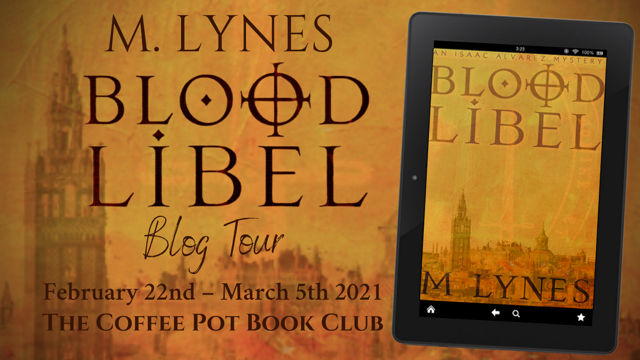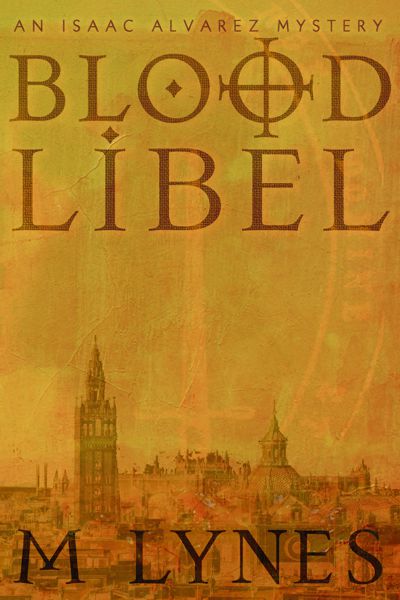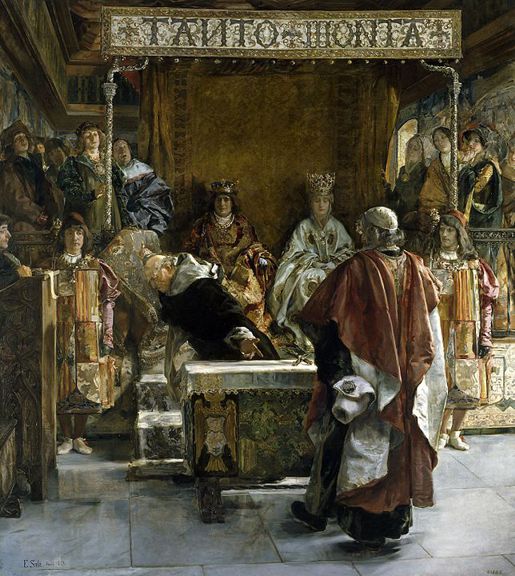
Seville, 1495
The mutilated body of a child is discovered behind a disused synagogue. The brutal Spanish Inquisition accuses the Jewish community of ritual child murder – the ‘blood libel’. The Inquisition will not rest until all heretics are punished.
Isaac Alvarez, a lawyer working for the royal estate, is a reluctant convert to Catholicism who continues to secretly practice Judaism. When his childhood friend is accused of the murder Isaac is torn between saving him and protecting his family. Isaac is convinced that solving the murder will disprove the blood libel, save his family, and protect his faith.
As the Inquisition closes in how far will Isaac go to protect both his family and his faith?

An historical aspect of Blood Libel : Conversos and marranos
Blood Libel is set in the Catholic Kingdoms of late medieval Spain where oppressive policies and attitudes forced many Jews to embrace Christianity – they were known as conversos. The term comes from the Latin conversus which means the converted. A central element of Blood Libel is Isaac Alvarez’ identity as a converso. Those who converted to Catholicism but secretly continued to practice Judaism were called crypto-Jews or, even worse, marranos – meaning swine. Powerful Christian families were suspicious of conversos, and they accused them of various crimes including the abduction of children. The religious establishment sought to save the souls of these heretics by persuading them to return to the right path through the ‘Holy Office for the Propagation of the Faith’ – the Spanish Inquisition.
The Christians conquered Seville in 1248, seizing it from the Muslim rulers who had held it since the early 8th century. At this point the Jews were warmly welcomed and a vibrant community of merchants, accountants, artisans and doctors flourished. The Black Death changed everything when it arrived in Spain in 1348; Jews were blamed for poisoning wells and creating poverty. This reached a peak in 1391 when almost half of the Jews in Seville were massacred. Those who still openly practiced Judaism were expelled by the Catholic monarchs Ferdinand and Isabella in 1492 by the Alhambra Decree, also known as the Edict of Expulsion. Many of the remaining practicing Jews chose to join the already large converso community rather than face exile.

Isaac, the main protagonist of Blood Libel, continues to practice Judaism by reading from a Torah at home and attending secret prayer meetings. This extract from Blood Libel recreates one of these meetings that takes place on the Sabbath:
“Twelve chairs are arranged in a circle; two are empty. The minyan is complete, they are fortunate to be quorate in the current climate. Eyes closed, each wears a kippah, the black skullcap that is the symbol of their faith. The room is almost completely dark, except for two candles in tall brass holders on an oval table in the middle of the circle, and a solitary oil lamp. The windows are closed and the two doors on either side of the circle bolted shut. Isaac breathes heavily in the almost airless room. They do not use names. This precaution, taken at the first meeting five years ago, seems even more prescient now.”
They then recite the prayers and reflect on their dwindling numbers. This exchange closes the scene:
“I want you to know, Isaac, that I will keep our faith and I will celebrate the Sabbath every week, but we will not meet under these circumstances again. It is only a matter of time before we are found out. The Edict of Grace changes everything. We cannot evade the Inquisition; it is a wonder that Juan does not appear to have given our names.’ He looks deeply into his glass. ‘Perhaps in time it will be different.’
Isaac nods and watches as the two candles sputter and struggle to stay alight.” (p33)
The meeting happens following the publication of the Edict of Grace. This declaration invited citizens to relieve their consciences by attending the tribunals of the Inquisition and denouncing the heresies of their friends, family and neighbours. The Church would, in its great benevolence, afford citizens thirty days’ grace in which to offer information to avoid severe punishment. If someone failed to make use of this grace period, and was later accused of heresy, they would be severely punished. Heretics were not allowed to face their accusers, received no legal representation and were often falsely accused.
Conversos had to be mindful of every aspect of their existence. If smoke was not seen coming from their chimney on the Sabbath or they did not keep a joint of ham visible in their window they could be accused of practicing Judaism. The Inquisition had a network of familiares – spies and informers who would pass on information to the Holy Office. This set neighbour against neighbour and generated a febrile atmosphere of terror and suspicion.
Blood Libel attempts to imagine and recreate what that experience must have been like for one converso family, dealing with constant anxiety and impending terror. I think this will resonate with many contemporary readers.
Meet Michael Lynes

Michael is an author of historical mysteries who writes under the pen name of M Lynes. He has a particular interest in early 16th century Andalucia. He is fascinated by the interplay between cultures, globalization and religious intolerance of that period in Spain’s history. The ‘Isaac Alvarez Mysteries’ are set against this rich background. He won a prize for his fiction at the 2020 Emirates Literature Festival and is an alumna of the Faber Academy’s Writing a Novel course.
His debut novel ‘Blood Libel’, the first full-length Isaac Alvarez Mystery, was published in January 2021. Isaac, a lawyer working for the royal estate, must solve a brutal child murder to protect his family and his faith from the Spanish Inquisition.
Michael is hard at work on the second novel in the series and planning the third. He is originally from London but currently lives in Dubai with his family.
Connect with Michael
Website: www.michaellynes.com
Twitter: https://twitter.com/MLynesAuthor
Facebook: https://www.facebook.com/MichaelLynesAuthor
Thank you so much for hosting today’s blog tour stop!